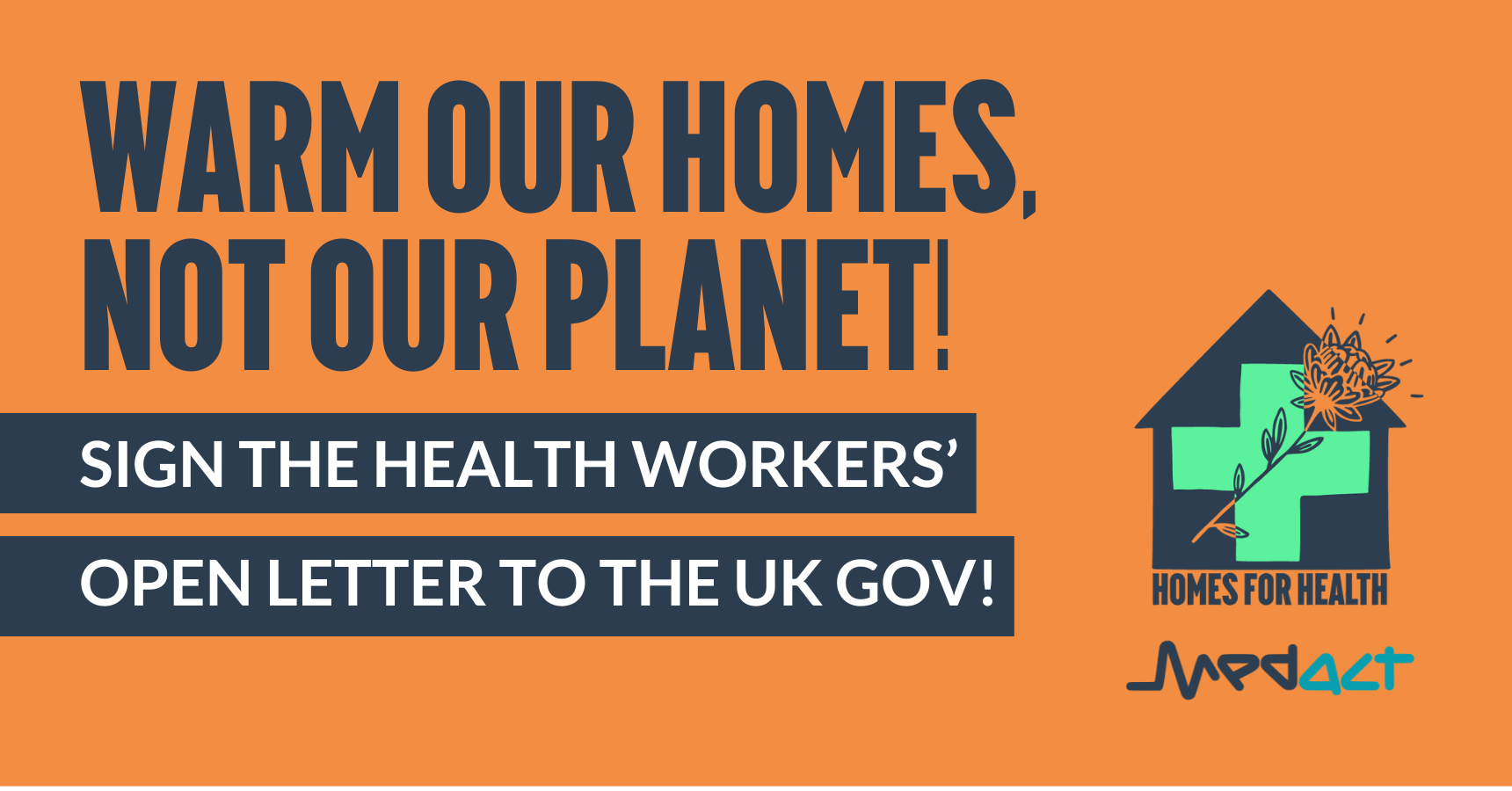
Open letter from health workers to the Secretary of States for energy and housing
Millions of people in the UK live in homes that are cold, damp, and mouldy. We can’t afford our energy bills, our houses are poorly insulated, and our government continues to rely on dirty, expensive fossil fuels.
As people working in health, we see the sharp end of this crisis in our workplaces and in our communities. These problems cannot be solved by the health system.
We need political action that will introduce policies to improve the quality of our homes, ensure everyone has access to the basic right to energy, and we need our energy security to rely on clean and affordable renewable energy. Ultimately, homes should be a place of comfort, health and security, not sites of illness.
Take action! Sign the open letter from health workers calling on the government to warm our homes, not our planet, and demand:
- Quality homes for all and a comprehensive retrofitting programme
- Energy justice
- A rapid just transition away from fossil fuels
You can sign either as an individual or as a health organisation!
You can also optionally add your postcode, which will remain private, to help us understand the spread of signatures across the country.
To: Secretary of State for Levelling Up, Housing and Communities of the United Kingdom
The health and social care community are witnessing a growing crisis of fuel poverty. Millions of people across the UK are living in cold, damp and mouldy homes. This constitutes a public health emergency.
In England, nearly 6 million people are living in fuel poverty. According to the Institute of Health Equity, nearly 10 million households are living in poorly insulated homes and have incomes below the minimum required for an acceptable standard of living. Cold and damp homes are harming the health of people of all ages, including severe impacts on children.
An abundance of research, including a recent report by Institute of Health Equity, lays out stark evidence of the health impacts of fuel poverty and cold and damp homes. Greenpeace estimates that 58 people a day have died every winter because of cold homes since government cuts to insulation funding starting in 2013.
Energy bills (and other essentials) are still costing much more than in 2021 and energy debt is at record levels – meanwhile, energy firms have made billions in profit. Rents are unaffordable and UK housing stock is among the most poorly insulated in Europe. The poor energy efficiency of many UK homes is a contributor to increasing housing-related financial difficulties, causing people impossible choices between heating their homes or eating a hot meal.
In the 21st century in the UK, health workers should not be treating people for conditions related to cold homes. This is having a huge impact on an already overstretched healthcare system. The NHS spends around £2.5 billion a year treating illnesses directly linked to cold and damp homes, and around £1.4 billion a year treating those affected by poor housing. When the societal costs are added, this figure rises to £18.5 billion per year. Estimates have shown that investing in solutions to tackle the crisis of cold homes would be paid back in under 8–12 years (depending on housing type) when considering costs to the NHS. Some have pointed out that the costs to society and the NHS are likely to be underestimated, therefore the costs could be paid back even sooner.
The NHS was never meant to treat the symptoms of an unequal economic system. This public health crisis cannot be solved by health workers – it requires political action to address its root causes. Taking the necessary action will not only save and improve lives, but it will also help to tackle the climate crisis and create good quality jobs – critical to the health of us all.
We call on you to:
1. Prioritise quality homes for all and introduce a comprehensive retrofitting programme
- Strengthen minimum energy efficiency standards in the private rental sector
- Introduce the Future Homes Standard (to ensure all new homes are built to a decent standard that won’t need retrofitting) and the Clean Heat Market Mechanism (to bring down the cost of heat pumps) as soon as possible
- A large-scale investment in workforce upskilling to implement retrofitting that is safe, healthy, and sustainable
2. Ensure energy justice
- Ensure no one is left without access to essential energy needs, by offering broader support than is currently offered by the Warm Homes Discount – whether this is in the form of a social tariff, ending prepayment metres, or more ambitious reforms like a national energy guarantee
3. Ensure a rapid just transition away from fossil fuels
- Invest in renewable technologies that will cut bills, deliver energy independence and ensure a just transition
- Take concrete steps to implement the policy of no new oil and gas licences, refuse any applications for new oil and gas fields, and commit to agreeing a just transition plan for the oil and gas sector; and to removing the obligation to maximise the economic recovery of oil and gas
We would be happy to meet with you to discuss our concerns or answer any further questions.
Your sincerely,